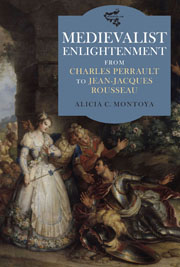Introduction
Published online by Cambridge University Press: 05 May 2013
Summary
Perceptions of medieval literature, far from being a simple matter of philological interest, have historically been fraught with ideological implications. Thus, for example, when, announcing the advent of romanticism, Madame de Stael famously proposed that “romantic or chivalric literature is indigenous to us‘. she was not only celebrating the birth of a literary movement. She was also saying something about the literature that was, according to her, most appropriate for the French national-political context of her day. Opposing Napoleon's neo-classicist ideal, the Middle Ages stood in her writings for an alternative, freer model of art and power. Likewise, when, following France's 1870 defeat in the Franco-Prussian war, scholars and writers such as Gaston Paris self-consciously set out to professionalize the study of medieval literature, it was often with explicitly nationalistic intentions. And at yet another crucial historical junction, during the rise of fascism in the 1930s, the medieval past, as exemplified by its literary traditions, again became prominent in some writings, where it was made to embody the ideals of different parties. The Middle Ages are a site of ideologically laden critical debate par excellence for, when speaking of them, very often it is of ourselves that we are really speaking. Thus, reflecting this intrinsic ideological aspect, I prefer to use the adjectival “medieval” rather than the more absolute “Middle Ages” in order to convey this sense that the medieval is as much a quality ascribed to certain artefacts or phenomena as it is a historical marker.
- Type
- Chapter
- Information
- Medievalist EnlightenmentFrom Charles Perrault to Jean-Jacques Rousseau, pp. 1 - 14Publisher: Boydell & BrewerPrint publication year: 2013

